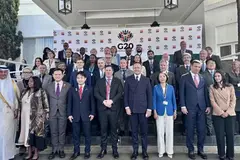South Africa puts Ubuntu philosophy on global nutrition agenda ahead of G20 Summit
Key takeaways
- South Africa will introduce Ubuntu’s values into the global food and nutrition security agenda at the 2025 G20 Summit.
- Despite food availability, sustainability gaps and price shocks drive hunger. SOFI 2025 shows that one in 11 people globally, including one in five Africans, face hunger.
- The country calls for climate-resilient agriculture, stronger local value chains, and support for smallholder farmers, shifting from aid to sustainable systems.

G20 ministers met at the Security Task Force Ministerial Meeting in Cape Town, South Africa, to discuss political efforts and the urgency for tackling food and nutrition security. The country aims to integrate Ubuntu Principles — “I am because you are” — into a broader global context, ensuring that commitments benefit farmers and communities.
Africa’s Ubuntu philosophy emphasizes values of interconnectedness, community, compassion, and mutual respect, focusing on shared humanity rather than individualism. John Steenhuisen, Minister of Agriculture, South Africa, states that the nation should show that Ubuntu is not just a philosophy but a global practice in food security.
He underlines the urgency for change as South Africa ranks fifty-ninth on the Global Food Security Index — “not because of a lack of food, but because of weaknesses in sustainability and adaptability.”

According to the UN 2025 State of Food Security and Nutrition in the World (SOFI) report, 638–720 million people faced hunger in 2024 — one in 11 globally and one in five Africans — including 48 million in the Southern African Development Community region alone, at a crisis level of food insecurity.
“Though South Africa is not one of the nine most severely affected countries, the spirit of Ubuntu tells us that this suffering diminishes us all,” says Steenhuisen.
He outlines progress made this year, the most recent one being the September meeting, which resulted in a consensus on the Ubuntu High-Level Principles during South Africa’s 2025 G20 Presidency.
Ubuntu principles on the global stage
This year’s G20 summit will be held in Johannesburg on November 22–23. Steenhuisen says leaders at the event will officially bring Ubuntu Principles into the global framework.
He adds: “At the World Trade Organization (WTO), we will continue pressing for fairer agricultural rules that reduce distortions and protect the interests of farmers in developing countries.”
“Moreover, through the African Union’s Agenda 2063 and the Comprehensive African Agriculture Development Programme framework, Africa will carry this momentum into the coming decade, ensuring that global commitments translate into regional and national action.”
Investing in nutrition and resilience
Steenhuisen and the ministers have co-developed concrete proposals, and the Ubuntu High-Level Principles were made to deal with excessive price volatility and persistent food inflation. SOFI shows that although more people could afford healthy diets, inflation and budget cuts jeopardized those gains.
“Our policy recommendations stress the need for sustainable, resilient, and inclusive food systems; evidence-based risk planning, including climate-responsive early warning systems; and nutrition-centered approaches that put human well-being at the heart of food systems,” he stresses.
Calling for a move away from foreign aid reliance, Steenhuisen points to the need for investments in diversifying food sources, including fisheries and aquatic foods. This includes making local and regional value chains stronger to reduce reliance on imports.
“We must support smallholder and family farmers with inputs, extension services, and access to finance. We must tackle post-harvest losses through storage, cold chains, and logistics, and we must diversify cropping toward more nutrient-rich foods.”
“We must also embed social protection, from school feeding programs to targeted transfers, as a core investment in stability and human development,” he adds.
Diet diversity and sustainable fisheries
Steenhuisen cites several other studies that reveal hunger is not caused by scarcity but by price shocks, input costs, climate disruptions, and market speculation. Additionally, delegations also called for greater diversity in healthy diets.
“The EU, UK, Norway, and others stressed the role of sustainable fisheries and aquatic foods in food security and the urgency of tackling illegal, unreported, and unregulated fishing and harmful subsidies.”
“The entry into force of the WTO Agreement on Fisheries Subsidies is a milestone in this regard. By eliminating subsidies that fuel overfishing and illegal and unregulated practices, this agreement helps ensure that fisheries remain a sustainable source of nutrition, livelihoods, and economic opportunity, aligning trade rules with the goals of food security and environmental stewardship,” highlights Steenhuisen.
The WTO’s Agreement on Fisheries Subsidies aims to prevent fish depletion caused by illegal fishing and stock exploitation and protect fishing communities’ livelihoods.















